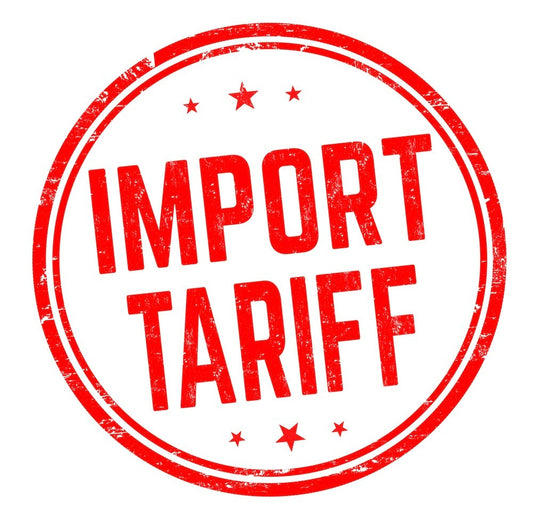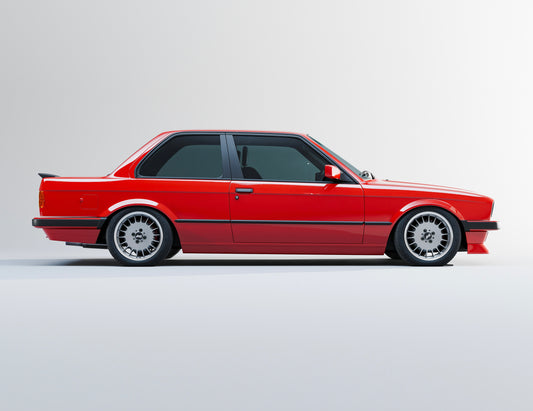
Let's Talk About Tariffs
Share
April 3 update: an additional 34% in tariffs has been added by the Trump administration. My current cost increase due to tariffs stands at 79%, with no guarantees of not going even higher…
No doubt most of you have been made aware that our country has recently enacted some pretty aggressive trade policies aimed at various countries we've traditionally done a lot of business with.
I won't bring politics into this discussion; my goal here is to help you understand how these tariffs affect me, and how in turn that may also affect you.
Since my days running fifteen52, and for more than ten years, I've used a couple factories in China to manufacture my wheels. Each is ISO 9001 certified and consistently one of the top quality manufacturers for the aftermarket wheel industry. They also happen to manufacture wheels for various OE companies (one of them makes all the OE wheels for the Porsche Macan and Cayenne vehicles). I have never once had an issue with their engineering capabilities, or their approach to quality control. Pricing has always been more than competitive as well.
In case you didn't realize it, the current US federal tariff issue has massive economic consequences for the automotive aftermarket wheel industry as a whole. The last SEMA figures I noted stated that more than 80% of all cast wheel production takes place in China.
I share all of this info with you because in 2019, a tariff of 25% was placed on all aluminum wheels brought in from China. This year, an additional 20% in tariffs has been added on top of that amount. There is talk of further escalations in the near future.
Contrary to popular belief, tariffs are NOT paid by the countries to which they apply: they are 100% charged by, and paid to, the US federal government, and they are paid by the American business that is importing the products - in this case, me.
Am I able to absorb an additional 45% in product cost? Definitely not. As a very small-volume manufacturer (very rare in the cast wheel industry), I typically pay at least double for my molds, and at least 25% more for unit pricing. That’s just a part of my business model and I accept it for the freedom it gives me in making niche designs larger companies wouldn’t touch. But it also means my margins are smaller than most of my competitors.
For the first 25% in tariffs I tried to absorb most of it, but at this point I've already been forced to raise my pricing. Not on the wheels I already have in stock, of course, but for the wheels currently in production, I've already raised the MSRP that goes into effect when the wheels land. I've also reduced the pre-order discounts. My entire wholesale program may have to be curtailed. Further, I have put all future new designs and re-orders of the 15/16" Snowflakes on indefinite hold: I simply can't risk placing new orders with my factories without knowing what my future overall pricing will be. Like many others in my situation, I just need to sit tight and wait to see how things go.
At this point I'm sure some of you want to ask, "Brad, why not just make the wheels somewhere else? Why not make them here in the USA? Isn't the whole point behind tariffs to encourage companies like yours to bring manufacturing back to the States?"
Those are fair questions, and easy ones to answer: at this point, there is no "safe" country to which I can move production. Reciprocal tariff threats have been made against all the other countries that offer OE-quality cast wheel production. I am personally aware of some of my (much larger) industry peers who have spent thousands of dollars and added extra months of production time in moving their manufacturing to other SE Asian countries, only to now have to wait and see if those countries will also get hit with tariffs as high as 30% or more...
And to answer the second part of the question, to my knowledge there are no automotive cast wheel foundries in existence in the US. There haven't been any for a long, long time. I'd love to be able to proudly scream, "Made In The USA!" - and I know lots of you would pay extra for that to be true - but the fact is that for cast wheels it's simply not possible.
These are definitely strange times we're living in, and here's hoping we all come out better (or at least okay) when all is said and done. I can only hope that not only will my customers understand, but that they'll also be willing to pay a bit more for my products.
Ultimately, though it's 100% true that RML wheels are as far as you can get from what one could consider to be necessities, I did want to share with you how some of these major policy changes are affecting the automotive enthusiast community and the businesses who cater to it.
Thanks for coming to my Ted Talk today.
*If you have any questions about this, please feel free to email me directly at brad@rmlwheels.com



